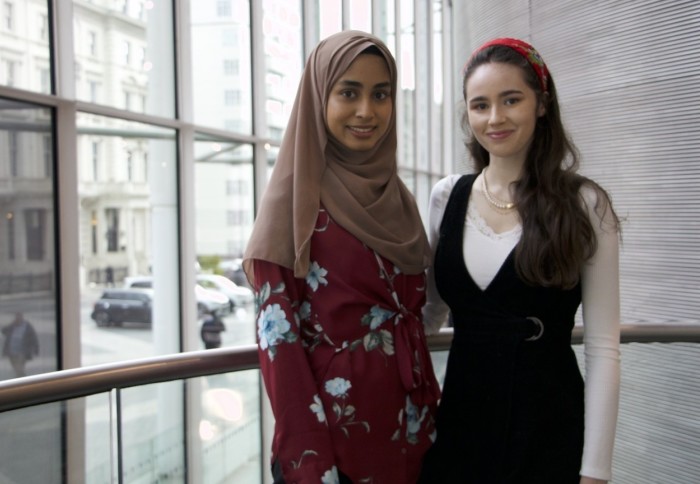Mattress topper for detecting bedsores wins top prize at Imperial student event

Luthfun Nessa and Anna McGovern of Calidiscope
The Institute of Global Health Innovation (IGHI) has announced the winner of its annual Health Innovation Prize.
The £10,000 prize fund was awarded to Calidiscope. The team from Cardiff University pitched their idea, a mattress topper that uses innovative sensors and machine learning to detect pressure ulcers, to a judging panel at the virtual competition final on Tuesday night.
Calidiscope competed with four other finalists to win the top prize. The competition showcased global health ideas created by students from UK universities including Imperial College London, Newcastle University and Queen’s University Belfast. The projects pitched featured a robotic glove to improve grip in people with hand weakness and an AI platform to remotely monitor diabetic foot ulcers.
Out of 46 teams from 13 universities, five were shortlisted for the final. At the event, participants had just two minutes to present their ideas, followed by a challenging round of questions from the panel and the audience.
Attendees of the final also voted for their top finalist. The Audience Choice Award went to Happyr Health. Led by Imperial students, they impressed the audience with their mobile app to help children with chronic pain.
The winner
Cardiff University medical student Luthfun Nessa and co-project lead Anna McGovern are the founders of Calidiscope. Their mattress topper integrates novel sensors and machine learning to reduce the incidence of pressure ulcers. The solution can measure a marker of inflammation, allowing pressure ulcers to be detected at an early stage.
“We are thrilled to win the £10,000! It will help us immensely with the research and development of building our full-sized device..." Luthfun Nessa and Anna McGovern Founders of Calidiscope
Calidiscope hopes to provide better care for people with pressure ulcers by helping nurses determine when to reposition patients in hospital beds. Their idea would provide nurses with automated documentation about the patient’s condition and treatment via a smartphone.
Pressure ulcers or bedsores are injuries that happen to skin and underlying tissue mostly caused by prolonged pressure, which can cut off the blood supply. They often affect people who are confined to a bed or in a wheelchair for long periods. Bedsores are estimated to affect 4-10% of all people admitted to hospital in the UK. Developing these ulcers means a two-to-four-fold increase in the risk of death in older people in intensive care units.
They hope their winning idea can help to save lives and revolutionise care for people with pressure ulcers. The team plan to use the prize fund to help develop their device:
“We are thrilled to win the £10,000!” said Luthfun and Anna. “It will help us immensely with the research and development of building our full-sized device, which will enable us to start our clinical testing and accelerate our progression. This has been a great experience and we’re extremely thankful for the opportunity.”
The audience favourite
 Taking home the title of Audience Choice Winner was Happyr Health, led by Cornelius Palm and Nicola Filzmoser, students on Imperial’s MSc Healthcare and Design course. Their mobile app seeks to transform pain management for children and young people, specifically those who experience migraines.
Taking home the title of Audience Choice Winner was Happyr Health, led by Cornelius Palm and Nicola Filzmoser, students on Imperial’s MSc Healthcare and Design course. Their mobile app seeks to transform pain management for children and young people, specifically those who experience migraines.
The pair have developed an app that allows young people who experience migraine to playfully engage with coping techniques such as breathing exercises or meditation. Children can keep a diary on the app to track their progress, which also provides useful insights to parents.
“Yesterday’s IGHI final pitches highlighted five great innovations that can bring valuable change to our healthcare systems,” said Nicola and Cornelius.
“We were honoured to be part of the competition with Happyr Health, especially as we were chosen as the Audience Choice Winner. Congratulations also to the prize winners and all the best for their venture!”
Facing the judges
Formerly known as the Student Challenges Competition, the Health Innovation Prize has been running for eight years. Every year, IGHI invites UK university students to submit their global health ideas in a bid to win £10,000. A small number are then chosen to face a panel of judges at the final of the competition.
This year, the task of evaluating the pitches and grilling the finalists came down to three judges: Dr Richard Smith, IGHI visiting professor and former editor of the BMJ; Dr Ana Luisa Neves, IGHI Advanced Research Fellow and Associate Director of the NIHR Imperial Patient Safety Translational Research Centre; and Dr Will Cavendish, Digital Services Leader for Arup. All three judges possess a wealth of experience in global health and as entrepreneurs.
“The judges were impressed with all the finalists, and they had done well to reach the top five from 46 entries from students across the UK,” said Dr Smith, who chaired the event.
“We selected Calidiscope as the winner because the team impressed us with their research and energy and have devised an innovative system for preventing pressure sores, which cause great suffering and generate high costs across the world.”
Article text (excluding photos or graphics) © Imperial College London.
Photos and graphics subject to third party copyright used with permission or © Imperial College London.
Reporter
Nikita Rathod
Communications Division